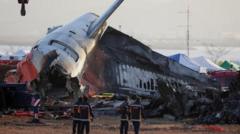The crash of a passenger plane in South Korea, claiming 179 lives, has left investigators puzzled as the flight recorders stopped capturing data just four minutes prior to the accident. The absence of crucial information raises questions about the conditions leading to the tragedy, including a potential bird strike and landing gear issues.
South Korea's Deadliest Plane Crash: Missing Data Leaves Investigators in Limbo

South Korea's Deadliest Plane Crash: Missing Data Leaves Investigators in Limbo
Investigations into the tragic crash of a Jeju Air flight reveal critical data missing from flight recorders, complicating efforts to understand the cause of the disaster.
The crash of a Jeju Air passenger plane last month has been classified as the deadliest aviation disaster in South Korea's history, claiming the lives of 179 individuals. Following the tragedy, investigators are delving into the circumstances surrounding the crash, but have encountered a significant obstacle: the flight data and cockpit voice recorders ceased functioning just four minutes before the incident, according to the South Korean transport ministry.
This devastating crash occurred on December 29, during the flight's approach to Muan International Airport after departing from Bangkok. Reports indicate that the aircraft landed approximately a third of the way down the runway without its landing gear deployed, subsequently skidding into a wall at the runway's end and igniting into flames. Of the 181 individuals on board, only two cabin crew members survived.
Initial analysis of the recorders, which were first examined in South Korea, revealed that vital data was missing. The "black boxes" were then sent to the United States for further investigation by American safety regulators. Sim Jai-dong, a former investigator for the transport ministry, expressed astonishment at the loss of data from the key moments leading up to the crash, noting that it indicates a potential loss of all power, including backup systems.
As the inquiry unfolds, various factors are being scrutinized, including whether a bird strike or adverse weather conditions contributed to the crash. Another focal point is the failure of the Boeing 737-800 to lower its landing gear prior to touchdown, a critical aspect that has prompted further investigation.
With many questions left unanswered, the families of victims are experiencing deep frustration and grief as they await recovery of remains and a thorough examination of the events leading to this tragic aviation accident.






















